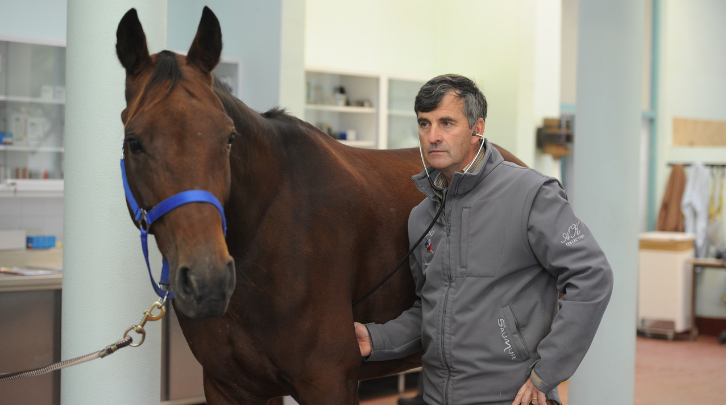In the world of equestrian sports, the balance between performance and animal welfare is essential. Xavier Goupil, an equine veterinarian with over 35 years of experience, shares his expertise on the integration of new technologies, particularly Equimetre, within the French eventing team. In this interview, Xavier Goupil discusses the challenges associated with the use of Equimetre, the adjustments he has made to his veterinary practice, and the compatibility between high athletic performance and equine welfare.
Could you introduce yourself?
I am Xavier Goupil, an equine veterinarian. I work for both the French Equestrian Federation and as a team veterinarian for eventing for over 20 years. Additionally, I have been a veterinarian at IFCE in Saumur for 35 years.
How do you manage to reconcile these roles?
I maintain a professional balance by working full-time at IFCE. In my free time, I have a liberal practice that occupies many of my weekends and a significant part of my holidays, mainly for the follow-up of the French eventing teams.
What challenges and objectives led the Federation to invest in a solution like Equimetre for the French team?
For a long time, we have had well-established habits. What is interesting today is our ability to be increasingly precise in debriefings. Having reliable and easy-to-use equipment is very appealing. This year, we were able to cover three gallops with Equimetre. The quality of analysis and the data’s precision are interesting and beneficial for everyone.
Does this help reassure you about the condition of the horses in the lead-up to the Olympics?
Indeed, when we have an event like the Olympics, having measured and precise data is reassuring. It provides a solid foundation that allows us to adjust our strategy between two gallops and ensure that the horses meet our expectations. The sensation is very important, but the measurement is equally significant.
Has this changed your approach to veterinary care? Have you adjusted anything?
Yes, for the final preparation, having completed three gallops allowed us to analyse the first two in depth. We shared this analysis with the riders and their coaches, which allowed us to make slight adjustments to the third gallop based on the identified needs.
Do you think high-level competition and horse welfare are compatible?
For me, high-level performance and horse welfare are entirely compatible. Many people are dedicated to the well-being of these horses, and we pay extreme attention to every detail. There is a team completely devoted to the horses and their performance. We should not oppose these two concepts. Everything is done to ensure the horse’s welfare. When reading the veterinary regulations of the FEI, the introduction states that the horse is sovereign. At the Olympics, everything is done to ensure the welfare and comfort of the horses while allowing them to perform.
Do you notice differences in horse management based on discipline?
Indeed, the level of effort required is different for a dressage horse, which may exert more explosive effort but for a shorter duration. In eventing, the effort spans three tests, with recovery periods between each. On the first day, the horse should almost behave like a dancer, while the second day presents a real obstacle course. The demands in terms of effort are therefore very different, but all of this is managed with significant expertise from many participants.
What do you think about integrating new technologies in the equine field?
The new technologies recently introduced in equine veterinary medicine are very beneficial. However, I believe a veterinarian should maintain their observational skills. Sensation and observation should take precedence, and measurements should be here to support our impressions. I reassure myself with the acquired data. I would find it hard to imagine that even a novice veterinarian would start by focusing on numbers before developing an intuitive understanding of horses. It is essential to grasp things well and feel them thoroughly, then verify as often as possible.
With the use of Equimetre, does the acquired data support your veterinary practice and experience?
Yes, the data we obtain reassures us in our practice. We had already used other technologies before Arioneo, so we did not start from scratch. Things are accelerating. This may sound a bit presumptuous, but it is true to say that these tools provide us with real security. I am glad to have evolved in this direction, combining field experience with data acquisition. I have been fortunate to live in an era where this was possible, and I am satisfied with it.
Keywords :
Equimetre, Arioneo, veterinarian, horse, eventing, Olympics, recovery, observation, welfare

